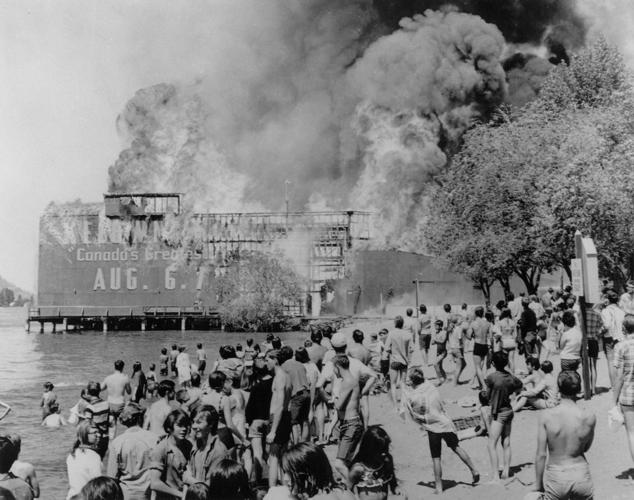A purpose-built swimming venue is planned for the northwest corner of City Park in Kelowna.��
The structure, many details of which are yet to be devised, is designed to mimic the old Aquatic centre, which burned down in 1969.
“It will rise from the ashes,” infrastructure delivery manager Brian Beach told city council this week.��
“Wonderful!” yelled Coun. Charlie Hodge, who was born in Kelowna and who sometimes reminisces at council about Kelowna’s old days.��
The Aquatic, which had a large public grandstand known��as Ogopogo Stadium, was the centrepiece for Kelowna Regatta celebrations, the long-running sports and family-oriented festival that ended abruptly in the late ‘80s after two successive summers in which downtown Kelowna was rocked by riots.��
A bidding opportunity posted on the city website invites designers and builders to submit proposals for a “City Park Swim Venue - an iconic waterfront destination that aims to enhance recreational access, restore the natural shoreline, and celebrate Kelowna’s history and Indigenous heritage”.��
“The project will also establish a continuous waterfront connection between Hot Sands Beach, City Park, and Kerry Park,” the posting says.��
The city’s invitation for proposals on a new swim venue suggests the facility would include “inclusive seating and gathering opportunities, informative panels on Kelowna’s history, a pavilion, waterfront steps, floating docks, four 50-metre swim lanes, a diving platform, and enhanced environmental works.”
Interested parties have until July 17 to submit proposals.��
City Park was created after Kelowna residents voted to buy the necessary private property in 1909, at a cost of $30,000. The municipality, then only four years old, had only $2,000 available for the purchase; the rest had to be borrowed.
Over the decades, a variety of buildings and activity centres have come and gone in the park, including a long driving route, an oval running track, and a restaurant.
But it was the park’s loss of the Aquatic, in a blaze believed to have been started by children playing with matches, that was felt most keenly by many Kelowna residents.��
“Many of us grew up at the Kelowna Aquatic Club in City Park. The sprawling grandstand and its in-lake swimming pool was everyone’s summer home,” local historian Sharron Simpson recalled in a 2014 article she wrote for this newspaper.��
“There was a 50-metre open water swimming pool, a terrifying 10-metre diving tower, and all day in the sunshine was what an Okanagan summer was about,” Simpson wrote. “Sunscreen had never been heard of, though baby oil was liberally lathered on to ensure the best tan possible.”
The Kelowna Aquatic Association was incorporated on April 26, 1909, with a capital of $10,000 for construction of a suitable clubhouse and grandstand. It underwent several renovations and additions, including a dance parlour, teahouse, and orchestra pit.
“The Aquatic Association and all that it stood for became one of the most important elements in the life of Kelowna residents, making it one of the City of Kelowna’s greatest assets,” local resident Pat d’Easum recalled in a 2015 article. “The Regatta was considered the biggest aquatic sporting event in Western Canada and visitors and competitors from all over the Okanagan, B.C., and Washington state assembled in huge crowds in the grandstand.”
In addition to swim meets, there were diving competitions, glitzy nightly shows, and races featuring war canoes, sailboats, and hydroplanes.
The Aquatic and the adjacent 4,400-seat Ogopogo Stadium burned down on June 14,1969, in a blaze that took firefighters five hours to extinguish. Mayor Dick Parkinson had tears in his eyes when he spoke to reporters the following day, describing the fire as a “real blow” to Kelowna.��
Nevertheless, he said, that year’s Regatta would still go ahead in a variety of other venues, and it did. He also vowed the Aquatic would be rebuilt: “We must have the Aquatic facility. Other buildings throughout the city simply can’t handle the load.”
The Aquatic, however, was never rebuilt. The city used the $325,000 insurance settlement to build the Parkinson recreation centre, which included Kelowna’s first indoor public swimming pool.��
��


